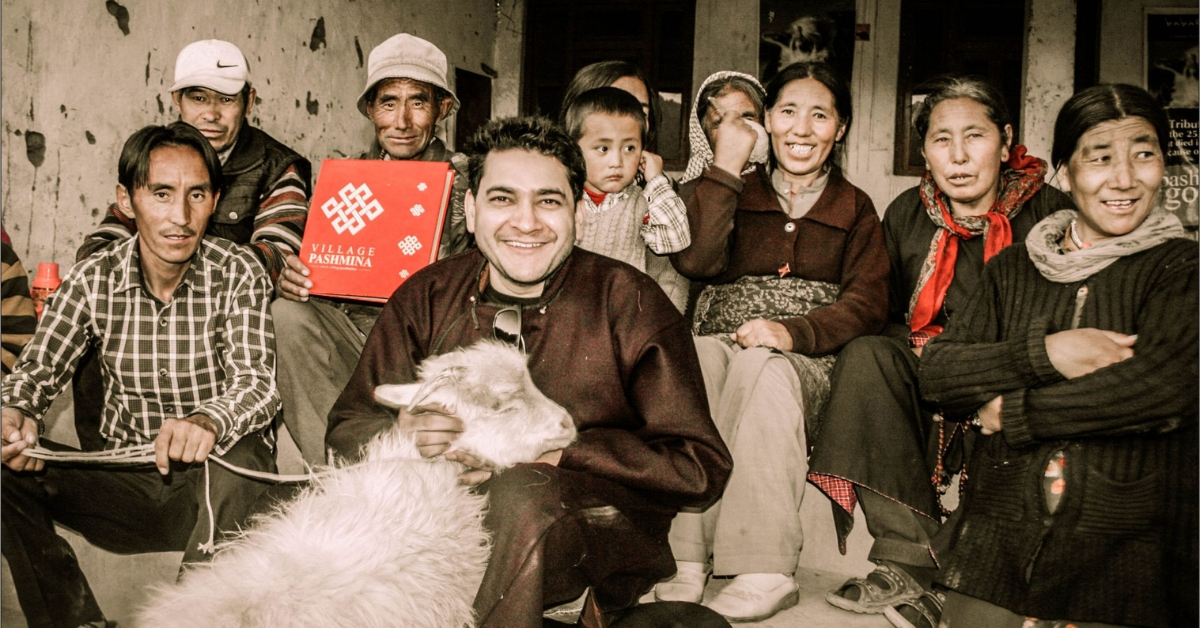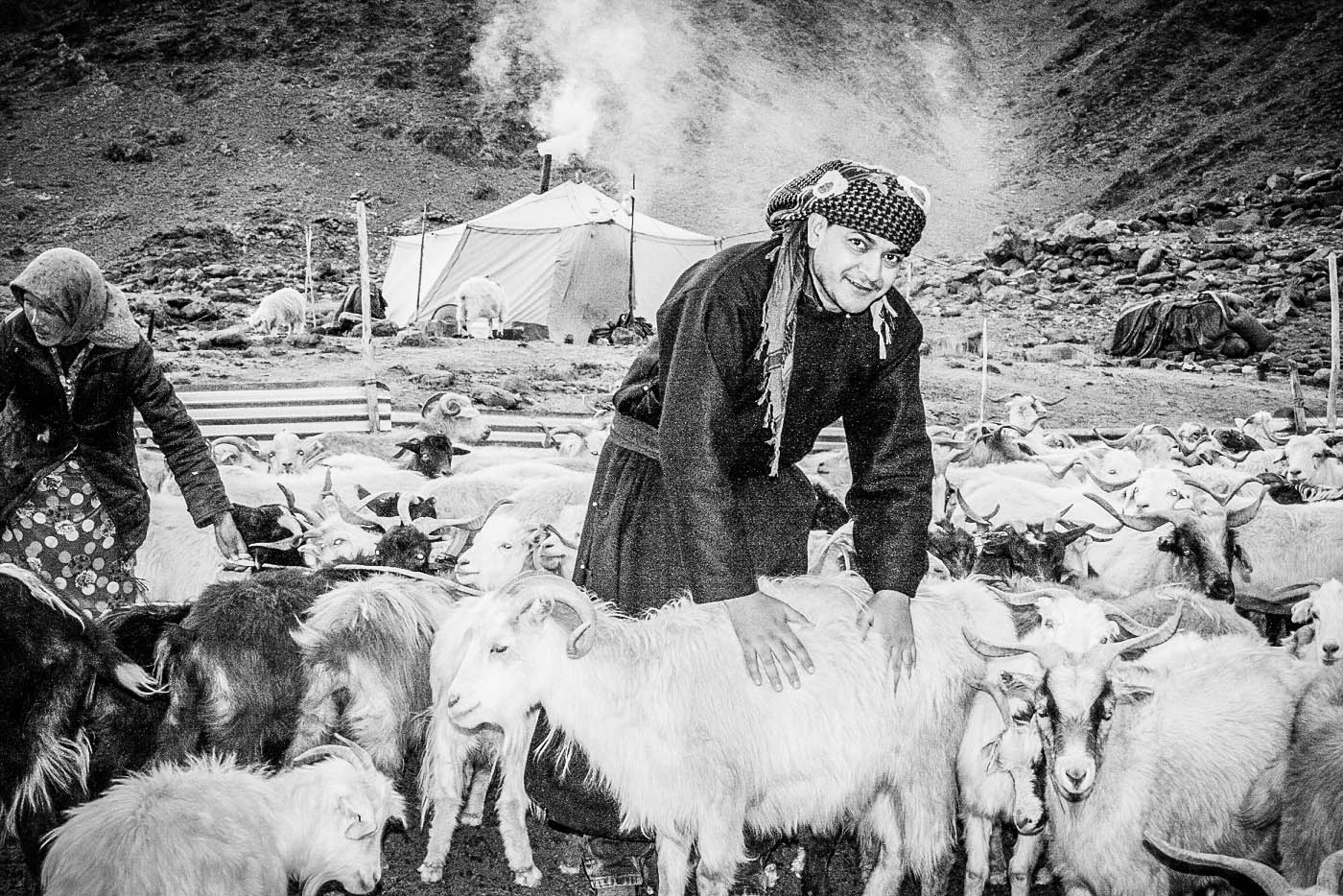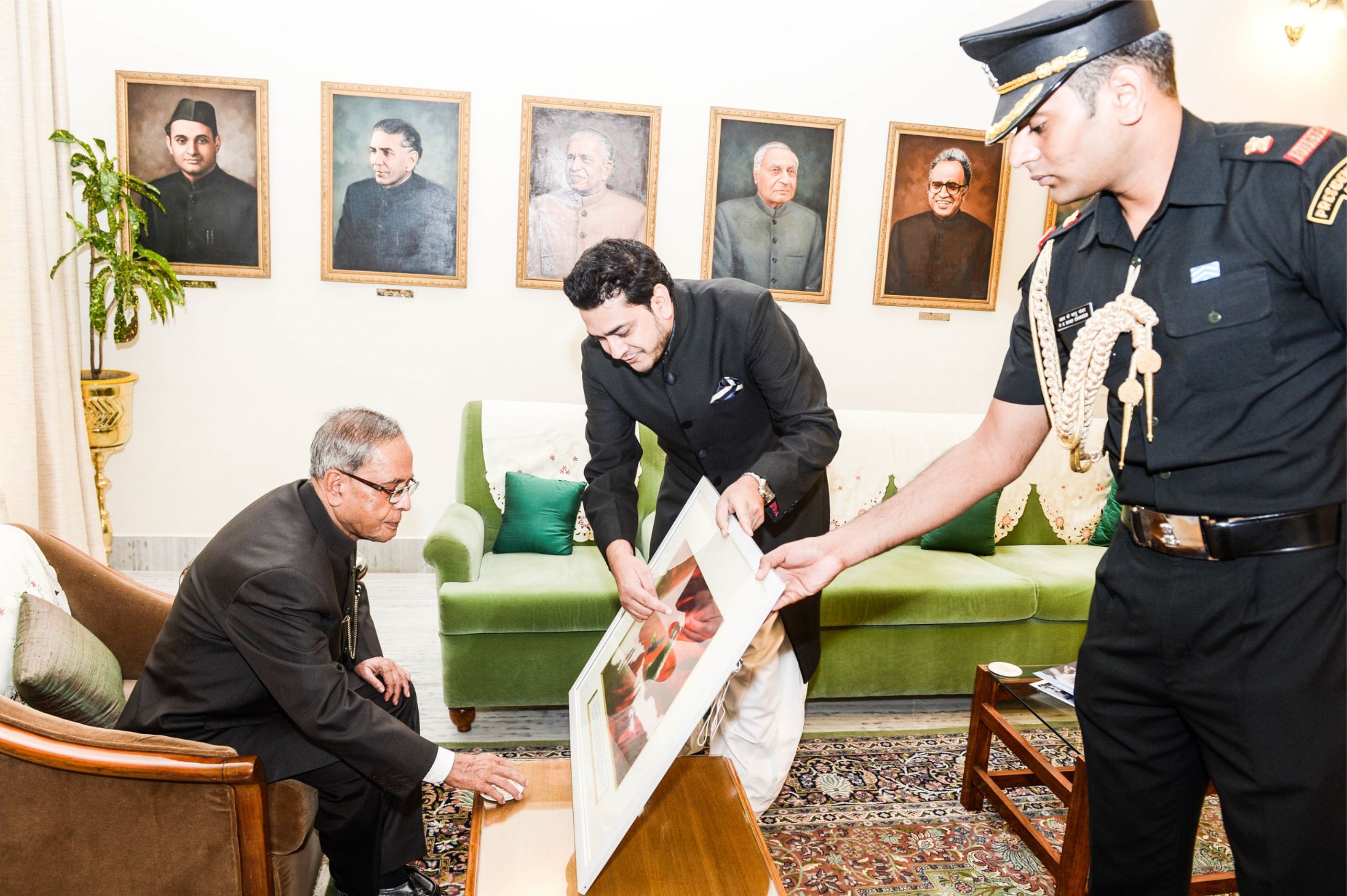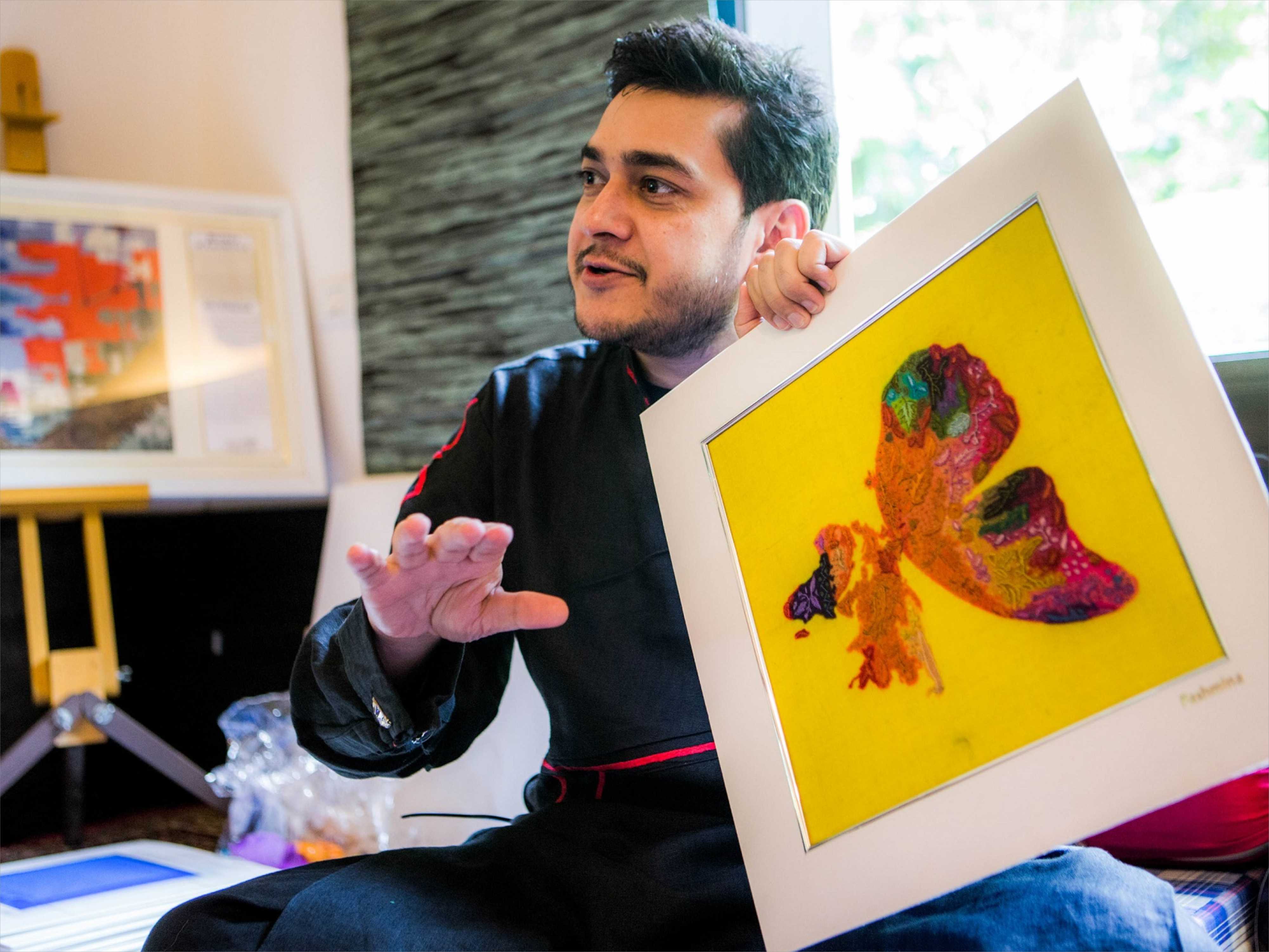Shepherds Saved His Life. So He Became One Himself To Save a Truly Precious Product!
Quitting his lucrative job in USA, Babar Afzal took up a cause that is today protecting one of India's most valuable luxury products as well as the livelihood of over a million.

Gasping for breath, Babar Afzal tried to run as fast as he could to save himself from being attacked by a snow leopard in a village close to Leh.
Although he was not able to think, Babar was fully aware of the fact that running in a freezing temperature of -30 degrees at an altitude of 14,000 feet was futile.
‘This is it; I am not going to open my eyes ever again,’ was Babar’s last thought before he fell unconscious.
When he woke up the next day, he was told that a group of shepherds saved his life and brought him to the hospital.
This experience in 2013 changed his life.
Today, Babar is an activist, artist, entrepreneur and author, and his goal is to rebuild the entire eco-system of Pashmina, globally famous as a luxury product.

In an exclusive interview to The Better India, Babar recalls that day.
When I got to know that snow leopards attacked hundreds of Pashmina goats I visited the village to understand the issue but alas I wasn’t physically fit for that kind of altitude. Then, I had that near-death experience, and after shepherds saved my life, I felt that I was honour bound to do something for their community.
How It All Started
A few months before the leopard attack, Babar was sitting in his office in the United States when he came across a news that shook him.
In a tragic incident, nearly 25,000 Changthangi goats had starved and frozen to death in the Ladakh region.
Changthangi is a breed of the cashmere goat, which inhabits the plateaus in Tibet, Nepal, parts of Burma and Ladakh. The goats grow a thick, warm undercoat which is the source of Pashmina, a fine type of cashmere wool.
The wool which is six times thinner than the human hair is estimated to be a billion dollar industry in the near future.
While this is an impressive prediction, it is equally depressing considering the ground reality of Pashmina goats and artisans including shepherds, weavers and retailers.
Also Read: The Story of Bindi: Connecting the Dots Between Culture, Fashion & Urban Women!
Multiple reasons are responsible for disrupting the entire eco-system of Pashmina in Jammu and Kashmir.
To begin with, the uncertain climatic conditions in the region has led to a situation where the National Bureau of Animal Genetic Resources has had to put the Changthangi goat breed on the ‘endangered species’ list.
Being a cold desert region, Changthang, which is in south-eastern Ladakh receives very less rainfall. It is the summer rain that lasts for a couple of days, that supports the small patches of pastures. The pastoralist community largely depends on fodder for the survival of the goats.
In 2013, due to very little rain, enough fodder wasn’t available, and the rainfall had cut off the region for the outside world. In this scenario, there was a delay in providing the fodder, and the goats starved to death. The few pastures that were there, were covered with snow making it impossible for the goats to graze for over three months that caused this huge tragedy.
While this may not be the situation every year, an unbalanced climate due to global warming will directly affect the economy in future.
Climate change is a far bigger problem than man-made problems like terrorism. It takes anything between six months to six years for Pashmina weavers to weave the fabric in the freezing temperatures. All this hard work is marred when the goats die affecting their economy, says Babar.
The region produces around 50 tonnes of raw Pashmina every year, and one kilo can produce two shawls each fetching up to $200,000. Meanwhile, the traders get underpaid.

In addition to the above reasons, low-quality and machine-made Pashmina in the market produced by China and a couple of regions in India, are also a threat to the community and has created competition for the craftsmen.
In short, political uncertainty, unusual climatic conditions, fake Pashmina, decreasing population of goats motivated Babar to quit global career as a techie and a business consultant and help the region, that he was born and raised in.
I always wanted to leave Jammu and Kashmir as it was a conflicted zone. I did my graduation and went on to work with the finest companies abroad. I was leading a fairly comfortable life when I came across this news. After doing my research I packed my bags and moved across continents, says the 43-year-old.
During his first visit to Changthang, Babar travelled for three months on foot to reach the village and then there was no looking back! His Unplanned journey had just begun.
For The Love Of Pashmina
Babar, along with his wife, Heena, started the Pashmina Goat Project from his savings.
The project has three objectives—preserve the Pashmina goats, raise awareness and create a platform where the craftsmen and shepherds get a fair deal. With his entrepreneurial skills, he is now selling the Pashmina in the markets and fetching a fair price for the community.
In the past few years, we have been working to build an authentic, sustainable luxury Pashmina brand that is co-owned by the community. We plan to launch it across the world, and eventually see it become a gold standard for Pashmina, says Babar.
Involving every stakeholder in the process is vital if the exotic Pashmina and their creators are to be saved from man-made and natural problems.
Under this project, the couple has been holding several round table conferences with experts, traders, retailers, leaders and policymakers across the world. From getting invited by House of Commons, British Parliament to garnering support from the former Chief Minister of Jammu and Kashmir Omar Abdullah, Babar’s journey has been acknowledged and supported worldwide.
Being an artist, he depicts the reality of Pashmina goats and the shepherds through his paintings every time he conducts an exhibition in India or abroad.

He uses the proceeds to support the shepherds and their families, while also educating people about the importance of Pashmina.
“I am trying to make every possible effort to sensitise the world leaders and influencers to understand the complexity of the eco-system that is directly impacting the future of one million people, and have been using art as a medium. I have developed and perfected a new art form (Recognized by the Government of Jammu and Kashmir) called ‘Luxury Pashmina Art’ where I use Pashmina Wool, Cotton, Vegetable Dyes and Acrylic,” he says.
Some of his artworks are permanently displayed in the Rashtrapati Bhawan, and in the homes of celebrities.
Babar is also the author of the book ‘6 Times Thinner: The Call of Pashmina,’ which narrates his journey to save authentic Pashmina and bring in positive social change.
To attract investors and customers, the programme also offers a testing service to retailers, wholesalers and anyone who has Pashmina in their family.

He is also in the process of turning this movement into a social enterprise where he will give the ownership rights to the community who can then deal with the economics and trade of Pashmina. Babar has designed an application that will help the nomads with details like weather, prices, places they can auction their fabric and so on.
He is currently in talks with IIT to develop the above project and is also looking for investors and retail partners who are interested in their product.
This cause needs to be shared at a global level so people can come forward and understand the plight of the community and find solutions to help them and preserve the true heritage of our state and this beautiful eco-system. We are looking for partners and franchisees across India. We need investors who can invest in building luxury retail centres and become partners in a profitable and ethical Pashmina business, Babar signs off.
To get in touch with Babar, you can mail him at [email protected].
(Edited by Gayatri Mishra)
Like this story? Or have something to share?
Write to us: [email protected]
Connect with us on Facebook and Twitter.
This story made me
-
97
-
121
-
89
-
167
Tell Us More
We bring stories straight from the heart of India, to inspire millions and create a wave of impact. Our positive movement is growing bigger everyday, and we would love for you to join it.
Please contribute whatever you can, every little penny helps our team in bringing you more stories that support dreams and spread hope.



















